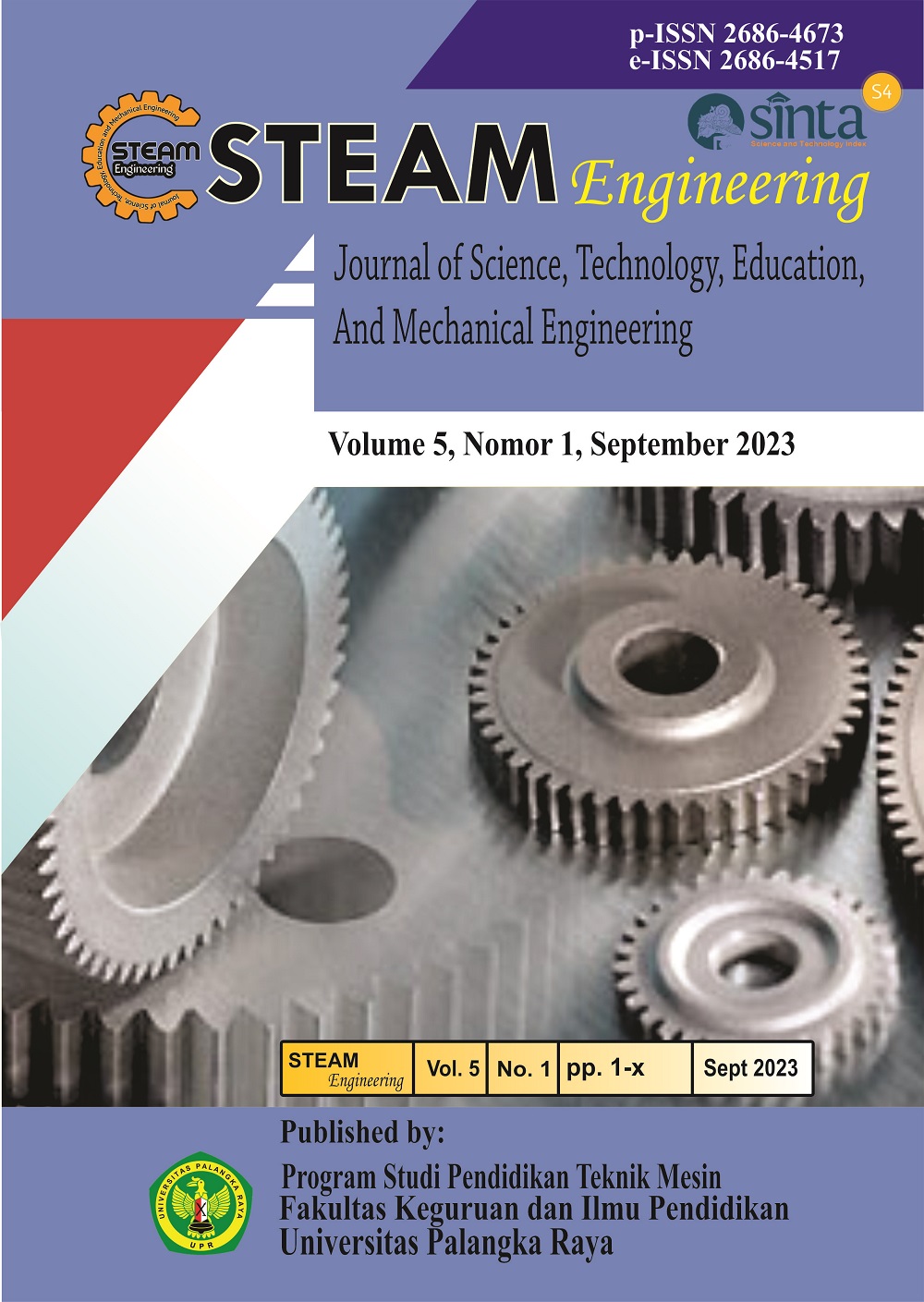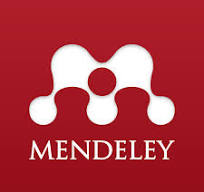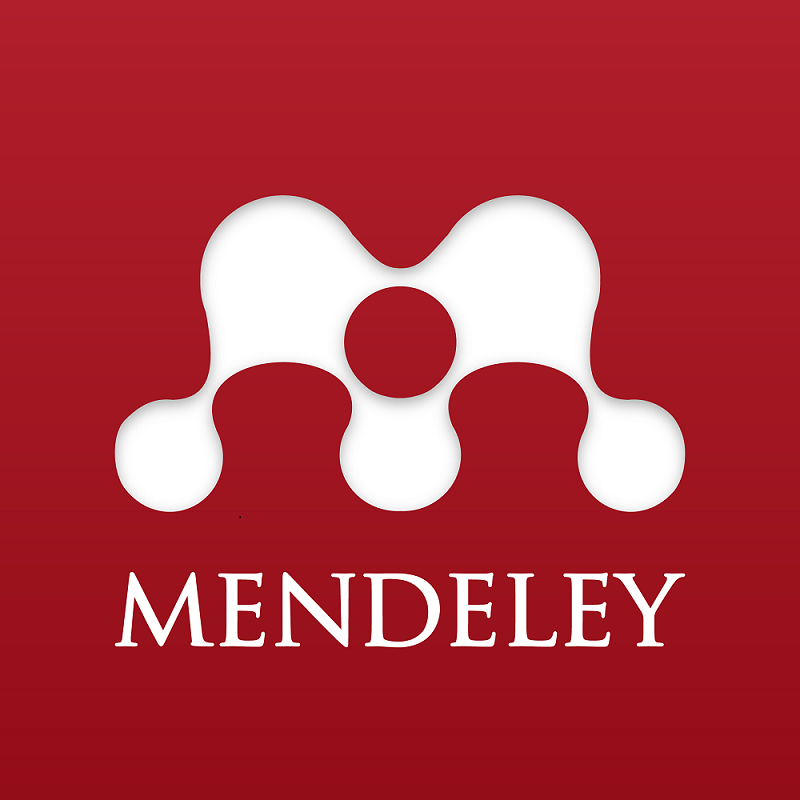SCL-STEM BERBASIS METAVERSE DALAM KURIKULUM MERDEKA BELAJAR UNTUK MENGEMBANGKAN POTENSI MAHASISWA TEKNIK MESIN
DOI:
https://doi.org/10.37304/jptm.v5i1.10657Keywords:
SCL-STEM, Metaverse, Kurikulum Merdeka Belajar, Teknik MesinAbstract
Pembelajaran di era metaverse yang didukung dengan kebijakan pemerintah terkait merdeka belajar merupakan suatu peluang bagi mahasiswa untuk belajar tanpa batas dan mengembangkan potensinya. Langkah awal untuk mewujudkan merdeka belajar di era metaverse salah satunya yaitu dengan memperhatikan kurikulum yang digunakan. Metode penelitian yang digunakan adalah kualitatif. Pengecekan keabsahan data dilakukan dengan menggunakan teknik triangulasi, member check, dan konfirmabilitas. Hasil penelitian menunjukkan bahwa SCL-STEM dalam kurikulum merdeka belajar terdiri dari beberapa aspek: 1) aspek implementasi model SCL-STEM, 2) aspek implementasi LMS, 3) aspek implementasi virtual meeting, 4) aspek implementasi discuss, 5) aspek implementasi kelengkapan bahan ajar, 6) aspek implementasi kemudahan transfer ilmu melalui video pembelajaran, 7) aspek implementasi kemudahan penyelesaian tugas. Hasil penelitian berdasarkan analisis data yaitu adanya SCL-STEM berbasis metaverse dalam kurikulum merdeka belajar di UNIRA Malang, dapat memberikan kemudahan mahasiswa terutama dalam berinteraksi secara langsung dengan dosen atau sesama mahasiswa melalui platform dan Learning Management System. Hal tersebut mencerminkan model pembelajaran merdeka belajar di era metaverse, karena mahasiswa dapat mendiskusikan suatu permasalahan dengan mudah dan tanpa batas. Selain itu juga dapat meningkatkan potensi mahasiswa teknik mesin.
Downloads
References
Adams, E. L. (2021). The effect of a middle grades STEM initiative on students’ cognitive and non-cognitive outcomes. Studies in Educational Evaluation, 68, 100983. https://doi.org/10.1016/j.stueduc.2021.100983
Barry, D. M., Kanematsu, H., Ogawa, N., & McGrath, P. (2021). Technologies for teaching during a pandemic. Procedia Computer Science, 192, 1583–1590. https://doi.org/10.1016/j.procs. 2021.08.162
Brooks, C., Burton, R., van der Kleij, F., Ablaza, C., Carroll, A., Hattie, J., & Neill, S. (2021). Teachers activating learners: The effects of a student-centred feedback approach on writing achievement. Teaching and Teacher Education, 105, 103387. https://doi.org/10.1016/ j.tate.2021.103387
Brouwer, J., Jansen, E., Severiens, S., & Meeuwisse, M. (2019). Interaction and belongingness in two student-centered learning environments. International Journal of Educational Research, 97, 119–130. https://doi.org/10.1016/j.ijer.2019.07.006
Chen, C.-H., & Tsai, C.-C. (2021). In-service teachers’ conceptions of mobile technology-integrated instruction: Tendency towards student-centered learning. Computers & Education, 170, 104224. https://doi.org/10.1016/j.compedu.2021.104224
Colombo, M. G., & Piva, E. (2020). Start-ups launched by recent STEM university graduates: The impact of university education on entrepreneurial entry. Research Policy, 49(6), 103993. https://doi.org/10.1016/j.respol.2020.103993
Damar, M. (2021). Metaverse Shape of Your Life for Future: A bibliometric snapshot. 8.
Erturk, E., & Reynolds, G.-B. (2020). THE EXPANDING ROLE OF IMMERSIVE MEDIA IN EDUCATION. 4.
Ho, M.-T., La, V.-P., Nguyen, M.-H., Pham, T.-H., Vuong, T.-T., Vuong, H.-M., Pham, H.-H., Hoang, A.-D., & Vuong, Q.-H. (2020). An analytical view on STEM education and outcomes: Examples of the social gap and gender disparity in Vietnam. Children and Youth Services Review, 119, 105650. https://doi.org/10.1016/j.childyouth.2020.105650
Jeong, H., Hmelo-Silver, C. E., & Jo, K. (2019). Ten years of Computer-Supported Collaborative Learning: A meta-analysis of CSCL in STEM education during 2005–2014. Educational Research Review, 28, 100284. https://doi.org/10.1016/j.edurev.2019.100284
Jeong, J. S., & González-Gómez, D. (2020). A web-based tool framing a collective method for optimizing the location of a renewable energy facility and its possible application to sustainable STEM education. Journal of Cleaner Production, 251, 119747. https://doi.org/10.1016/j.jclepro.2019.119747
Ketterlin-Geller, L. R., Zannou, Y., Sparks, A., & Perry, L. (2020). Empirical recovery of learning progressions through the lens of educators. The Journal of Mathematical Behavior, 60, 100805. https://doi.org/10.1016/j.jmathb.2020.100805
Khamhaengpol, A., Sriprom, M., & Chuamchaitrakool, P. (2021). Development of STEAM activity on nanotechnology to determine basic science process skills and engineering design process for high school students. Thinking Skills and Creativity, 39, 100796. https://doi.org/10.1016/j.tsc.2021.100796
Lee, J. Y. (2021). A Study on Metaverse Hype for Sustainable Growth. International Journal of Advanced Smart Convergence, 10(3), 72–80. https://doi.org/10.7236/IJASC.2021.10.3.72
MacCallum, K., & Parsons, D. (2019). Teacher Perspectives on Mobile Augmented Reality: The Potential of Metaverse for Learning. 9.
McIntyre, M. M., Gundlach, J. L., & Graziano, W. G. (2021). Liking guides learning: The role of interest in memory for STEM topics. Learning and Individual Differences, 85, 101960. https://doi.org/10.1016/j.lindif.2020.101960
Mukuka, A., Shumba, O., & Mulenga, H. M. (2021). Students’ experiences with remote learning during the COVID-19 school closure: Implications for mathematics education. Heliyon, 7(7), e07523. https://doi.org/10.1016/j.heliyon.2021.e07523
Murphy, C., Abu-Tineh, A., Calder, N., & Mansour, N. (2021). Teachers and students’ views prior to introducing inquiry-based learning in Qatari science and mathematics classrooms. Teaching and Teacher Education, 104, 103367. https://doi.org/10.1016/j.tate.2021.103367
Pramudibyo, S., Pradani, Y. F., & Tjiptady, B. C. (2023). Kontribusi Persepsi Lingkungan, Kompetensi Kerja, Dan K3 Terhadap Kinerja Pegawai. Steam Engineering, 4(2), 146-152.
Richter, E., Brunner, M., & Richter, D. (2021). Teacher educators’ task perception and its relationship to professional identity and teaching practice. Teaching and Teacher Education, 101, 103303. https://doi.org/10.1016/j.tate.2021.103303
Sandrone, S., Scott, G., Anderson, W. J., & Musunuru, K. (2021). Active learning-based STEM education for in-person and online learning. Cell, 184(6), 1409–1414. https://doi.org/10.1016/j.cell.2021.01.045
Sen, C., Ay, Z. S., & Kiray, S. A. (2021). Computational thinking skills of gifted and talented students in integrated STEM activities based on the engineering design process: The case of robotics and 3D robot modeling. Thinking Skills and Creativity, 42, 100931. https://doi.org/10.1016/j.tsc.2021.100931
Suzuki, S., Kanematsu, H., Barry, D. M., Ogawa, N., Yajima, K., Nakahira, K. T., Shirai, T., Kawaguchi, M., Kobayashi, T., & Yoshitake, M. (2020). Virtual Experiments in Metaverse and their Applications to Collaborative Projects: The framework and its significance. Procedia Computer Science, 176, 2125–2132. https://doi.org/10.1016/j.procs.2020.09.249
Warburton, S. (2020). Second Life in higher education: Assessing the potential for and the barriers to deploying virtual worlds in learning and teaching: Second Life in higher education. British Journal of Educational Technology, 40(3), 414–426. https://doi.org/10.1111/j.1467-8535.2009.00952.x
Yanez, G. A., Thumlert, K., de Castell, S., & Jenson, J. (2019). Pathways to sustainable futures: A “production pedagogy” model for STEM education. Futures, 108, 27–36. https://doi.org/10.1016/j.futures.2019.02.021
Zhang, L., Basham, J. D., Carter, R. A., & Zhang, J. (2021). Exploring Factors associated with the implementation of student-centered instructional practices in U.S. classrooms. Teaching and Teacher Education, 99, 103273. https://doi.org/10.1016/j.tate.2020.103273












